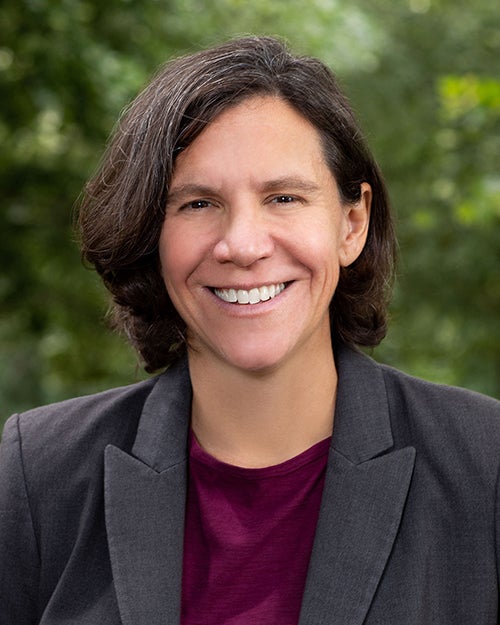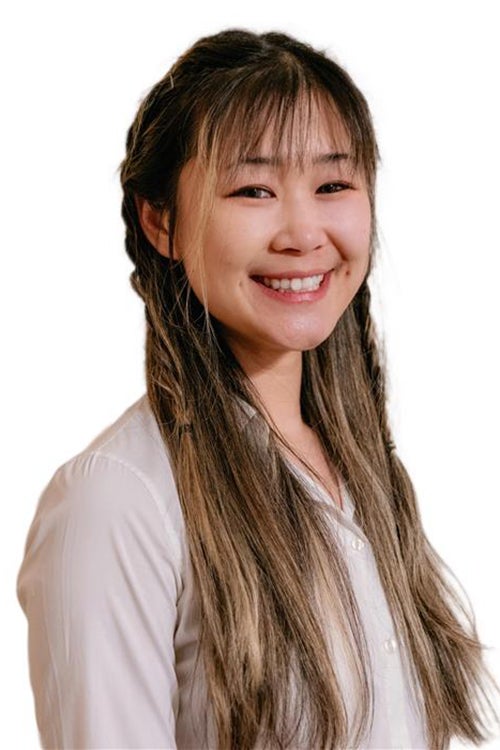What would you do if an unexpected tax bill arrived in the mail?
If you’re like the nearly half of Americans who say they live paycheck to paycheck, such an unhappy surprise could be more than a disappointment — it could be life-altering, say advocates at Harvard Law School’s Tax Litigation Clinic.
“What may have started off as a relatively small tax liability can quickly balloon with interest and penalties to an insurmountable bill,” says Audrey Patten, a lecturer on law and the clinic’s interim director. “That reality, combined with confusing procedures for resolving the problem, instills a lot of fear and stress in lower- and moderate-income earners. Our job is to explain some of the mystery and find a path forward for the client.”
Under Patten’s guidance, students in the clinic, which is part of the WilmerHale Legal Services Center of Harvard Law School, assist low-income Boston-area taxpayers in disputes with the IRS or the state of Massachusetts, and advocate for tax policy changes that could benefit those with few resources.

The clinic’s aim is to reduce or eliminate their clients’ financial burden — and in the process, alleviate an emotional one, too, says Tony Analla ’25, a student in the clinic. Analla says that, for many of the low-income taxpayers the clinic serves, an unforeseen tax liability of hundreds or even thousands of dollars can be devastating.
“This is often on top of other challenges they may be dealing with, such as a job loss, chronic illness or addiction, divorce, or the death of a loved one,” Analla says. “I’m grateful that, through our work in the clinic, we can take a little of the stress off of them.”
‘Surprisingly personal’
It begins with a letter — and a phone call to the Tax Litigation Clinic’s intake line. Analla says there are many possible reasons for an unforeseen tax assessment, ranging from a mistaken tax deduction or credit, to changes to one’s retirement accounts, to a debt unknowingly racked up by a spouse. Some people come to the clinic after having been the victims of scammers or fraudulent tax preparers, he adds.
And sometimes, clients may not even be sure where the charges stem from, says Audrey Cheng ’25. “Clients come in scared,” she says. “They’ve gotten a notice in the mail, they don’t know what’s going on, and often the notice doesn’t tell them why they owe the tax. Having someone to talk to, who can help them figure out what’s happening, can really help relieve their burden.”
Once Patten determines that the clinic may be able to help, the first step is for the assigned student attorney to get to know the client and their unique needs. These conversations can be surprisingly personal, Analla explains.
“Clients come in scared … They’ve gotten a notice in the mail, they don’t know what’s going on, and often the notice doesn’t tell them why they owe the tax. Having someone to talk to, who can help them figure out what’s happening, can really help relieve their burden.”
Audrey Cheng ’25
“You have to ask people a lot of questions about their life, their work situation, their family situation, to truly understand their tax situation,” he says. “It’s interesting. You often go in thinking the issue will be one thing, and it turns out there are a lot of different things you need to account for.”
For some lucky clients, there is a straightforward fix, as when the taxing authority has made a computational error, Analla says. In these circumstances, the clinic can often clear up the problem in a matter of weeks.
In other cases, there is room for argument about whether a client really owes the tax being levied, Cheng says. Here, the clinic represents the client in negotiating with the IRS or litigating against the IRS in Tax Court.

Having an attorney in these situations can be critical, Cheng says. “Most people fighting with the IRS or in Tax Court are unrepresented, which seems daunting given how complicated these processes are,” she says. “With an attorney, you are much more likely to bring better arguments and win.”
Then there are the clients who unambiguously owe money to the state or federal government. Yet even in these cases, Analla insists, a lawyer can make a big difference in the amount the person ultimately has to pay.
“In these situations, we can help clients draft what is called an ‘offer in compromise,’ which can settle their bill for less than what they owe,” he explains.
These applications — which Analla describes as both “an art and a science” — detail the taxpayer’s situation and why they are unable to pay the full amount owed without severe disruptions to their lives.
Cheng says that while taxpayers can theoretically draft these offers on their own, the clinic has a much higher success rate than average, perhaps in part because student attorneys help them gather and submit copious supporting documentation. “This process is really hard to navigate by yourself,” she says. “People don’t realize they need to attach months of utilities statements, bank accounts, car values, and much more. Also, the narrative is very important in these cases — we often write cover letters explaining their life story and how they ended up in the place they are, where they cannot afford to pay the tax. The IRS website doesn’t tell you that you can attach such a narrative.”
To Cheng, deciphering the byzantine world of the tax code is one of the biggest ways the clinic helps its clients. “It can feel like the tax system is impossibly complicated. Normal people can’t just pull up the tax code and understand what’s going on,” she says. “We help break down the issue into plain English. ‘Here’s where we’re at. Here are the options.’”
Having a collaborative attorney-client relationship is important, Cheng says. “A lot of my clients have said that their tax burden that they’ve been unable to pay off for years been the worst thing that they’ve ever had to deal with, but they appreciate having someone by their side as they weigh their choices,” she says. “I’m glad the Tax Clinic is there to support them.”
And the support has been tremendous: According to Patten, the Tax Litigation Clinic saved clients over $1.5 million during the 2024 tax year alone.
But money isn’t the only way to measure the clinic’s success, insists Analla. “We look at this in terms of dollar amounts, but it means more than that to clients. It means so much less stress for that person. And you just can’t quantify that.”
Working for change
Beyond its support of individual clients, the Tax Litigation Clinic works for systemic change, too. The clinic regularly represents organizational clients, such as the Center for Taxpayer Rights, which are working to expand taxpayer rights by filing amicus briefs in appellate litigation.
“Impact litigation matters because procedural rights in federal tax law affect the entire economic spectrum,” Patten says. “The expansion and protection of those rights should be a concern of everyone who earns money and pays taxes in the United States.”
In 2022, for example, the United States Supreme Court embraced arguments the clinic advocated that could allow filing deadlines in Tax Court in Collections Due Process to be extended for taxpayers with extenuating circumstances, such as a serious illness.
This seemingly small change could have huge implications for other types of Tax Court cases, according to Cheng.
“We look at this in terms of dollar amounts, but it means more than that to clients. It means so much less stress for that person. And you just can’t quantify that.”
Tony Analla ’25
“Generally, the deadline to ask the Tax Court to hear the case is set in stone,” she explains. “The law says you have 90 days, and if you file your petition in 91 days, you don’t get the Tax Court to hear your case, and you must pay the tax. Even if you were in a coma for 90 days, or if the USPS never delivered the notice to you, you are out of luck.”
The high court’s decision means that relief may be on the horizon for some taxpayers. Today, the clinic is working to find and represent clients who were previously denied an extension but who might soon have their day in Tax Court after all — thanks to the clinic’s efforts.
‘One of the most memorable experiences’
The clinic is transformative for students, too, says Cheng, who came to Harvard Law knowing that she wanted to work on economic policy and inequality. For her, the Tax Litigation Clinic was an opportunity to better understand how people interact with and are impacted by state and federal tax systems.
“I’m want any work I do in policy to be informed by the real problems that people are facing,” she says.
Cheng, who has taken the clinic for two semesters, will pursue tax law work at Davis Polk after graduation. Thanks in part to her clinic experience, she says she can see herself one day working in tax policy — or even as a staff attorney at a tax clinic.
“This has been one of the most memorable experiences of my time at HLS,” she says.
Like Cheng, Analla says he was drawn to the clinic for the chance to use the knowledge he’s gained in three years of business and tax law classes to help real people. “I learned that I enjoy disentangling tax issues,” he says. “With the clinic, I feel like I’m putting my skills to their best use.”
Analla’s experience further confirmed his interest in practicing tax law, which he will pursue as an attorney at Ropes & Gray after graduation. It even exposed him to some new areas of the tax law. “There is this whole other world, which is the process of interacting with and litigating with the IRS and the Tax Court,” he says. “It was very valuable to see how these things actually work before starting my career.”
But Analla and Cheng agree that the most rewarding part of their time in the clinic has been working with and getting to know their clients — and seeing how their effort has paid off. Literally.
“Every case is different. There’s always something new to learn about the law and about helping a client in a personal way,” Analla says. “It’s gratifying to know that if we can get something resolved even one month sooner, it might really change the game for that person.”
Want to stay up to date with Harvard Law Today? Sign up for our weekly newsletter.
